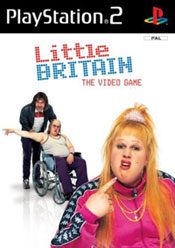I was in bed, watching old episodes of CSI on my PVR. Honestly, how can they have Wash from Firefly playing a paedophile? I was as shocked as the health and safety officers will be when they see the egregious violations going on in branches of Game and Gamestation throughout the country. You can’t pile boxes that high!
Category Archives: PlayStation
Kratos Smash!

I cannot believe what David Jaffe and SCE Santa Monica can make a PS2 do. That’s the overriding impression from watching and playing God of War 2. It’s incredible – you’ve probably seen the videos of the fight with the Colossus of Rhodes, and that pretty much makes up the whole first level. And then the next one puts you up against Typhon, who is even bigger. At this rate the final boss will be the planet Jupiter or something.
Everything else is understandably going to be a bit of a come down after that – especially when it gives you the Metroid-style contrivance to which you lose all your superpowered abilities gathered throughout the original and are forced to re-aquire them – and when the action has to exist at a sane level it plays much the same as God of War. I’m yet to come up against any of the really frustrating sticking points that the first game had (that crate pushing towards the archers on the first level nearly made me give up) and the combat is still more concerned with being visceral than the mechanics. And I mean ‘visceral’ in the most literal sense possible.
That’s the main problem I have with the game. Like its predecessor, GOW2 is beautiful to look at and seemingly reliant on that, as well as the always-interesting Greek mythology, to drive me to keep playing. Combat, while improving as you go through the game and get more attacks and therefore more options, is a bit of a button mash. Maybe it was deliberate in that it reflects Kratos as a character – lots of shouting and saying things like “RARGH!” a lot, hence the earlier Hulk allusion – or maybe it’s just a bit basic. It seems like a better game than the first one because it hasn’t, thus far, moved me to try to destroy a pad, which is probably a good thing considering that the reviews reckon it’ll take about twice as long to finish.
So if a PS2 can do this, who needs next-gen consoles with HD graphics? Me, for one. But this proves that the old ones shouldn’t be thrown in the cupboard just yet. A tentative thumbs up from me.
I Don’t Get Home
Yeah, yeah, yeah. Another ambivalent post about a Sony product.
Home (or ‘Second Home’ as it perhaps should be called) is an interesting concept and, as a game in its own right, would probably end up being similar to Animal Crossing. What I don’t get is all the comment going on about how it’s a killer app, combining the best of Xbox Live and the Wii/Mii service.
What I understand is that it’s something akin to Second Life, in which you create your likeness and have your little home, which you can decorate and play around in as you see fit. You get trophies from games that you can place in your trophy cabinet and you can invite people into your apartment to look at your stuff. Other than that, I don’t think I’d be over-simplifying things to say that it’s a GUI for the existing online service.
That’s my problem. For all the flash it’s still an online system that’s missing the fundamental features of Xbox Live. No unified friends list, no cross-title messaging or invites, etc. It unifies the system in that you can meet up with friends in Home and head over to the Motorstorm track or whatever, but that sounds like a pain in the arse next to just starting up a game and inviting your friends from a menu. When I want to start up Word, there’s a reason why I simply click it in the dock rather than come out of my virtual house and run to the Office (see what I did there?) down the virtual street.
In that sense it seems like a smokescreen for the holes in the online infrastructure. It pisses all over the Wii’s system – such as it is – and pretty much already does what we expect the eventual Animal Crossing Wii to do (minus fucking friend codes) and more, but we have a higher benchmark than that. This seems like more of an anti-Nintendo measure for Sony than anything to do with Microsoft, which I suppose might make more sense at the moment given relative sales.
LittleBigPlanet, on the other hand, looks beautiful. That was a decent announcement.
Little Britain: The Video Game

The bad guys in films are always the most fun, and it’s unfortunate that the same can’t be said for bad games. When bad games do get fun, however, is when you get to write about how bad they are.
In a fit of whimsy, partially inspired by the Eurogamer review, I downloaded this game. It’s not often that I’ll do this, but this game deserves it. It shouldn’t be purchased – EVER – and yet it’s a complete trainwreck of a game that should be seen by anyone involved in games. For them, it’s the paradigm of how a game shouldn’t be, and for anyone involved in this game it’s incriminating evidence that someone needs to hold as evidence for their future trials for crimes against gaming. And I only played it to prove these facts, obviously. If pressed I’ll claim that I was drunk.
Now I’m not a fan of Little Britain. I get called all the usual names when I tell people this, but I guarantee that when you go back to it in a few years, you’ll come to the realisation that it’s the same joke every single time. Lou turns his back, Andy runs around a bit, says “I want that one” and/or “I don’t like it” (a good summation of this game), cue canned laughter. How utterly hilarious!
Catchphrase comedy is shit, basically. And this game plays those catchphrases over…and over…and over…and over…again. Hardly the most endearing experience.
Even without my prejudices, though, this is a travesty. It’s actually pushing the limits of what I can justify as “amusingly bad”; one of those games that you stick on just to have a laugh at how bad it is. Everyone who’s ever fired up an Atari 2600 emulator (or owned the game, God forbid) has made a beeline for E.T., only to find out that it’s not the so-bad-it’s-good riot you expected: it’s just rubbish. This is the same kind of thing.
Sony vs. Kotaku
News about games journalism! Hooray!
The whole thing seems to be over now, but last night gaming blog Kotaku got into trouble with Sony for posting a rumour about what Sony was set to unveil at next week’s GDC. Sony told them not to, they did anyway, and Sony blacklisted them from all their mailing lists and future press events.
You probably won’t be surprised to hear that I was entirely on Kotaku’s side on this issue. As is often the case lately, I don’t know why Sony acted the way that they did. All throwing the toys out of the pram and trying to blackmail Kotaku did was give credibility to the story, whereas the usual “we do not comment on rumours or speculation” would have at least kept people guessing until next week. The way Sony acted the only possible outcome was for Kotaku to come out smelling of roses, simply because when it’s announced everyone sees that they got the scoop and didn’t give in when the big boys tried to bully them.
Of course, the majority of people supported Kotaku’s stand, but what surprised me when trawling forums was that a number of people were congratulating Sony on not putting up with such insolence, even going as far as to criticise Kotaku’s journalism, such as in this quote from IGN’s PS3 forum:
“Sounds like Kotaku got what they deserve. […] Seriously. Did these guys take any journalism courses at all?”
That sums up what far too many journalists reporting on this industry seem to think: that “journalism” means “typing up press releases” and taking what they’re given, which is often the complete opposite of what journalism should be. I’m not going to make myself look stupid by invoking some of the great investigative journalists because I have no illusions of reporting on this industry being comparable to anything what has been brought to light by political journalists in the past, but being cowed by any of the big industry figures is not journalism.
Bravo Kotaku. Now I hope you walk into that media event next week with a massive, proud grin on your face. You won that round.
That Back Compat Thing
Talk about setting one up. Even so, I’m going to start by playing a bit of a devil’s advocate by saying that the news doesn’t affect my desire to own a PS3. I still won’t be buying one next month. That’s my cheap shot out of the way.
Honestly, I think backwards compatibility is overrated. I was always going to have to keep my PS2 around since it’s chipped and my PS2 collection takes in games from all three major regions, and I think I’ve played a grand total of five Xbox games on my 360 since last year. Two of those for more than a few minutes, or for more than just to check out how they looked in HD. Aside from a bit of FFVII last summer, it’s similarly underused on my PS2. Others might find it more important, as I know plenty of people who only want one box under their TV and don’t want to chuck out some of their favourite games. Not to mention the appeal of seeing what PS1 games you can find for a couple of quid each in Gamestation.
What’s irksome about the whole issue is the way in which they’re going about it. I’ve made it clear how I feel about the price, as have countless others, and this just makes things worse. We’re now paying more for a late, lesser piece of hardware? Sony had already twisted the knife in the wound; now they’re pouring salt onto it. The fact that this all comes out weeks from launch with preorders (mysteriously not sold out anywhere yet) in full swing is just low. That’s pissing on you while you’re down and still crying about how much the salt hurt.
This is where the obligatory Kutaragi quote comes in:
“PS3 will feature backwards compatibility with PS and PS2 games from day one. I’m emphasising this because, from what I hear, there are some platforms that haven’t been able to completely do this. It’s costly in terms of hardware, but we’d rather invest firmly on compatibility from the beginning, rather than to have issues later on.”
I hear there are two platforms that haven’t been able to completely do this, Ken.
I don’t think anyone would really object to them switching to software emulation to save hardware costs when their emulator is mature, but why do we have to, essentially, pay extra to beta test this feature? Why not keep the EE/GS chip in there for the machine to fall back on if the emulator doesn’t support the game? And, more pertinently from a European perspective, why not roll this out worldwide if you’re going to do it? Why just us?
Fuck them. I’m going to sit back and wait for the next of the weekly PR disasters.
